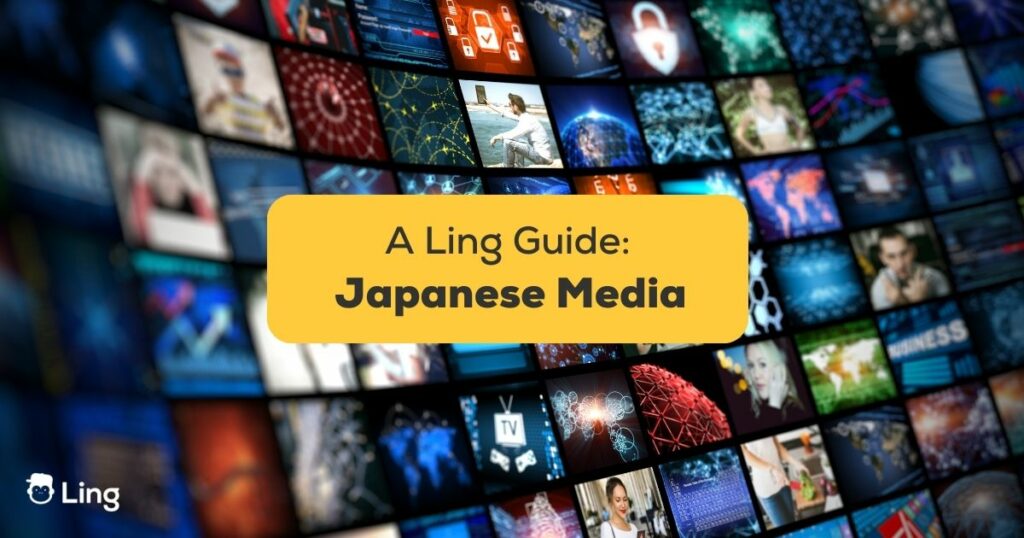Japanese media may seem utterly bewildering to foreigners and new expats. Flipping TV channels reveal wave after wave of noisy variety shows, flashy dramas, and endless commercials while newsstands overflow with newspapers and magazines full of those perplexing characters.
But while Japan’s media landscape appears chaotic on the outside, some clear major players have emerged across mediums after centuries of development. Getting to grips with just the key broadcast, journalism, and entertainment outlets goes a very long way to understanding the flow of information, news, and pop culture in the country.
In this guide, we’ll briefly spotlight the media brands, both historic and modern, having the greatest impact on public discourse and daily lives in Japan today. We’ll also cover words and phrases in the Japanese language that span traditional formats like print newspapers and radio to the digital deluge of blogs plus online TV altering the game.
Table Of Contents
Japanese Media
For those raised on American or European media, Japan can seem totally perplexing. Even the shows on their region-based Netflix are totally different. Networks blast chaotic gameshows, lurid tabloids scream headlines, and manga comics dominate packed trains. So, what exactly makes Japanese media tick differently from the West?
Fundamentally, it’s the unique mix of influences, new and old, blended in one creative cauldron. You have venerable papers like the Asahi Shimbun still driving discourse today that first began printing way back in 1879. Yet also zany multimedia juggernauts like Yoshimoto Kogyo churning out viral comedy and movie stars.
This fusion of ancient and modern drives the energetic variety. Where American outlets pick a lane, Japanese media meshes serious debate programs alongside wacky late-night shows rather seamlessly. Heart-wrenching dramas give way to insane competition stunts after the same commercial break.
The news itself unravels differently, too. Western journalism values impartial reporting and investigation with a clear separation of news vs entertainment. Japanese coverage seems more passive, with less analysis questioning authority. Critics argue press clubs foster relationships with officials that breed soft, less confrontational interviews.

Newspapers
Print newspapers still wield major influence in Japan, unlike the dying medium in the West. Huge circulations like the Yomiuri Shimbun’s 10 million readers give papers here unrivaled power-setting agendas. Page space is devoted to lengthy dissections of policy plans or bureaucrat scandals rather than flashy graphics.
This makes Japan’s broadsheets key for understanding the national conversation. The major dailies also now provide English editions for foreigners hungry for quality reporting. Let’s spotlight the key players:
- Asahi Shimbun – Daily, English-language Pages
- Nikkei Asian Review – English-language Pages
- Yomiuri Shimbun – Daily, English-language Pages
- The Japan Times – English-language
- Mainichi Daily News – English-language Pages
- Sankei Shimbun – Daily

Television Networks
While Japan’s wild variety shows grab eyeballs, the major national TV networks still dominate viewership for news and primetime entertainment. TV remains by far the preferred medium, with a 71% household penetration compared to only 63.1% for streaming in 2020.
NHK operates as a public broadcaster but lacks ads or the flash to compete with private commercial titans. So, for can’t-miss programming and global pop culture phenomena, keep these major networks on your radar:
- Nhk – Public, Operates General Tv, Educational Tv.
- Fuji TV – National, Commercial
- Tokyo Broadcasting System (Tbs) – National, Commercial
- Nippon Tv (Ntv) – National, Commercial
- TV Asahi – National, Commercial

Radio
While less influential than the 80s and 90s heyday, Japanese radio still provides a popular secondary stream of news and music hits not easily replicated elsewhere. Over 70% of car owners consistently tune in during drives for quick airline updates, while music fans rely on stations to showcase emerging artists.
The state media juggernaut NHK operates speech-based Radio 1 for news, and cultural Radio 2 digs deeper into educational topics.
- Nhk – Public, Operates News/speech-based Radio 1, Cultural/educational Radio 2
- J-wave – Tokyo Commercial Music Station
- Tokyo FM – Tokyo Commercial Network
- Inter Fm – Tokyo Commercial Music Station
- TBSRadio – Operated By Tokyo Broadcasting System

Internet-Based News Agency
The digital revolution has accelerated access to information and happenings across Japan for both locals and curious visitors. While legacy outlets still hold sway, these promising next-gen internet news brands are leading online:
- Kyodo – English language Pages
- Japan Today – Popular Expat Site
Easy Words For Japanese Media
Ready to sound like a true media geek in Japanese? Beyond the major players, equip yourself with these fundamental media vocabulary words:
| English | Japanese Script | Pronunciation |
|---|---|---|
| Television | テレビ | terebi |
| Radio | ラジオ | rajio |
| Newspaper | 新聞 | shimbun |
| News | ニュース | nyūsu |
| Magazine | 雑誌 | zasshi |
| Movie | 映画 | eiga |
| TV drama | ドラマ | dorama |
| Anime | アニメ | anime |
| Video image | 映像 | eizō |
| Internet | インターネット | intānetto |
| Social media | SNS | esu enu esu |
| Blog | ブログ | burogu |
| Comics, manga | 漫画 | manga |
| Article | 記事 | kiji |
Easy Phrases For Japanese Media
Know the basics of media in Japanese? Now you’re ready for real, local chats about the latest TV drama obsession or breaking celebrity gossip! Discover more from your favorite Japanese actors and beautiful Japanese actresses, and you’ll find yourself immersed in this amazing language.
Here are some simple conversational phrases to sound fluent:
| English | Japanese Script | Pronunciation |
|---|---|---|
| To watch TV | テレビを見る | Terebi o miru |
| To listen to the radio | ラジオを聞く | rajio o kiku |
| To read/follow the news | ニュースを読む | nyūsu o yomu |
| I like dramas | ドラマが好きです | dorama ga suki desu |
| I’m an anime fan | アニメファンです | anime fan desu |
| I read a lot of manga | 漫画をたくさん読みます | manga o takusan yomimasu |
| What is your opinion? | ご意見は? | goiken wa? |
| What do you think about ~ ? | ~についてどう思いますか? | ~ni tsuite dou omoimasu ka? |
Learn Japanese With Ling
Now equipped with this insider look at the major players across print, broadcast, and digital, that flood of strange shows, screaming headlines, and manga suddenly makes a lot more cultural sense! You can tune into the soul of what moves modern Japan.
To level up on the language front across any medium, be sure to use the handy Ling app! Ling provides bite-sized Japanese lessons focusing on real-world speaking skills for media fans. Learn essential words and phrases for discussing everything from colorful Train Man comics to the latest viral Jpop earworm.



































































